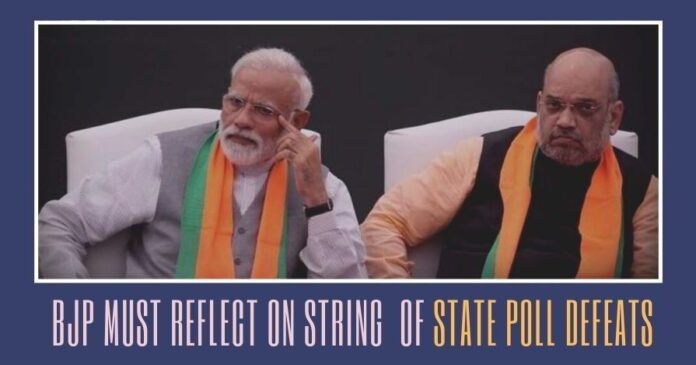
It is important for the BJP to check its State poll losses for one other important reason: numerical strength in the Rajya Sabha.
In the space of a year gone by, the Bharatiya Janata Party has lost power in five States. In four of these, it was beaten in the electoral battle. In one, it failed to return to the office because of the departure of a pre-poll ally when it came to government formation. It managed to form the government in one State only after it cobbled a post-election alliance. None of the above can be good news for the Narendra Modi & Amit Shah-led BJP, given that the local leaderships have let them down.
Do these setbacks mean that the game is over for the BJP in the forthcoming Assembly elections, first in Delhi and later on in Bihar, in 2020?
These have not been merely electoral defeats. In all of the States it failed, the BJP was displaced as the ruling party by either the Congress or an alliance which includes Congress. Last year it lost Madhya Pradesh narrowly, Rajasthan a little more decisively, and Chhattisgarh comprehensively — all to the Congress. In Maharashtra, the Shiv Sena, after breaking ranks with the BJP, tied up with the Congress and the Nationalist Congress Party to form the government with its supremo as the Chief Minister. And now, in Jharkhand, the BJP has ceded power to an alliance that includes the Congress, the Jharkhand Mukti Morcha, and Lalu Prasad Yadav’s RJD.
The BJP may seek to downplay these setbacks by pointing to its commendable victory in the 2019 Lok Sabha elections. It is true that the 2019 win — bigger in numbers, incidentally, than the one in 2014 — came only months after the party lost Madhya Pradesh, Rajasthan, and Chhattisgarh. But then its defeat in Jharkhand and the below-par performance in Maharashtra too came only months after its Lok Sabha triumph.
Something, therefore, has gone wrong for the party in state polls. The reasons, of course, differ from State to State, but there are some common ones too. The first is the over-dependence on the Modi factor. State BJP leaders believed they could sail through by using the Modi brand name and image, even when they had not risen to the local challenges in ways that the voters expected them to. These voters may have allegiance to Modi — and they expressed it in 2014 and 2019 general elections — but their loyalty to the local leaders depends on the latter’s ability to address State-specific issues.
The second factor is the belief held by BJP governments in the above States, that if they did not do anything dramatically wrong, they would be re-elected. It is a fact that the governments of Devendra Fadnavis, Shivraj Singh Chouhan, Vasundhara Raje, Raman Singh, and Raghubar Das had done reasonably well, but they failed to provide a game-changer as the elections approached. Contrast this with the Modi government’s surgical strikes in Pakistan, which contributed enormously to its image and popularity.
The third, which the State BJP leaderships need to realize — and they hadn’t in the above instances to their cost— is that condemning the opposition parties for the wrongs they did, works when the BJP is in the opposition. But when it seeks votes as a party in power, it will have to depend primarily on its achievements and less on the past follies of its rivals. After all, even when the comparison is to be done, they will be between the successes of the incumbent regime versus the failure of the past regimes.
A great deal will depend on whether the present coalition lasts — and if it does, how well does the chemistry work after the contentious seat and ticket distributions are done with.
And, finally, the fourth factor, which has to do with perception. In all the States that the BJP has lost power to its opponents over the last 12 months or so, its local leadership could not effectively counter the perception promoted and popularised by its rivals that it had failed the people. The inability to create a narrative in its favour through the good deeds it had done, could have been a result of overconfidence, or out of a sense of arrogance that comes with power, or even sheer ignorance about the shift in the public mood. It’s such complacency that hits the hardest.
Do these setbacks mean that the game is over for the BJP in the forthcoming Assembly elections, first in Delhi and later on in Bihar, in 2020? Certainly not, by any stretch. The party can bounce back, and it has shown its ability to do so on several past occasions. But it needs to play its cards carefully and make compromises wherever it needs to, without greatly diluting its core beliefs. In Delhi, for instance, it is faced with a formidable opponent in the Aam Aadmi Party (AAP), but there is hope too. In 2015, the AAP had swept 67 of the 70 seats on offer, and it cannot possibly better or even maintain that. The Congress, which got zero seats the last time around, cannot be expected to do any worse. In sum, if the AAP goes down and the Congress goes up somewhat, the BJP has an opportunity to gainfully exploit the situation. But to what extent, depends on a host of factors including the local BJP leadership’s ability to discredit Chief Minister Arvind Kejriwal’s many populist measures.
Bihar will be a very different battle. There, the BJP (now in alliance with Nitish Kumar’s Janata Dal-United and Ram Vilas Paswan’s LJP), will approach the voters as a party in power. A great deal will depend on whether the present coalition lasts — and if it does, how well do the chemistry work after the contentious seat and ticket distributions are done with. While the RJD without Lalu Prasad Yadav (he is cooling his heels in prison) is no longer what it was in its heyday, it cannot be considered a washout either — besides, what if Lalu manages bail in time for poll campaigning!
It is important for the BJP to check its State poll losses for one other important reason: numerical strength in the Rajya Sabha. If the party keeps losing States, it will find difficulty in getting its people elected to the so-called Upper House as and when vacancies occur. As a result, it will have to be at the mercy of non-NDA parties to bail it out when important legislations are proposed. The BJP cannot be guaranteed of cooperation from these parties all the time.
Note:
1. The views expressed here are those of the author and do not necessarily represent or reflect the views of PGurus.











Modi must bring back a smeblance of a people centric policy at state levels. It must chose its partners well and avoid arrogant and condescending BJP members like one that was witnessed in Jharkand where the CM candidate lost to a ex-BJP member. Modi must also get down to focussing on the economy as that would have huge impact on BJP’s state successes. A good advisor to listen to is Dr. Swamy who has many years of experiance and an intellectual disposition to understand Indian politics on which he has been spot on, like in the case of Jharkand. India jus cannot afford the return of Congress and the left.
According to me BJP can’t win state electections by not providing political and economic support to its core voter base of Middle class. For example instead of reducing the corporate tax, BJP should have drastically reduced the income tax for middle class. Even after getting thousands of crores in corporate tax reduction, Industrialist Rahul Bajaj has only surmon for BJP. Diverting too much benefits to poor doesn’t translate into proportionate increase in poor’s vote share. Modi government must not ignore the Middle class.
Absolutely correct. BJP has to reinvent its cadre based working and it should not ditch it’s close & dependable allies. Further the war cry will not carry it through.
If Nirmala Sitharaman is not able to deliver, then Subramaniam Swamy has to be given the responsibilities.
The reason is arrogance of BJP. Dumping the ally AJSU proved costly for BJP. Modi-Shah duo is intoxicated by absolute power and pushing the democracy to wall. BJP needs to rediscover its core idea of cadre based organisation instead of becoming a congress clone. Forming government by any means is not appreciated by people. The economy is in dire straits and this duo only harps on threat from Pakistan, which is crumbling on its own. By ignoring Pakistan, India can become a super economic power by emulating China’s economic reforms of 80s leaving Pakistan to destroy itself. It’s a pity that Bangladesh is surpassing us in textile exports. It’s time for Modi to realise the dire economic situation and take immediate steps for recovery.